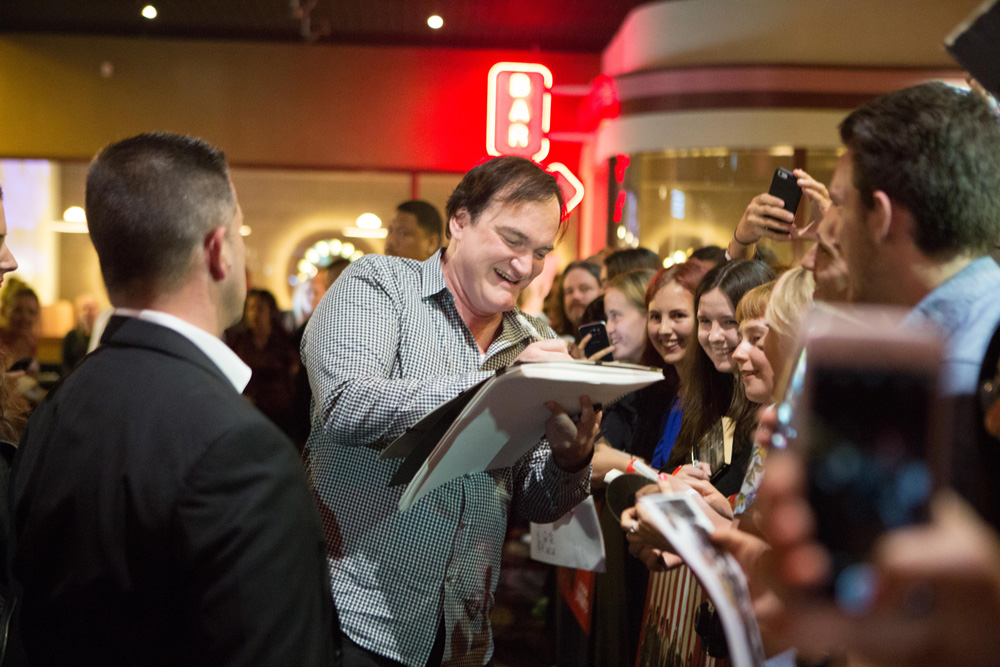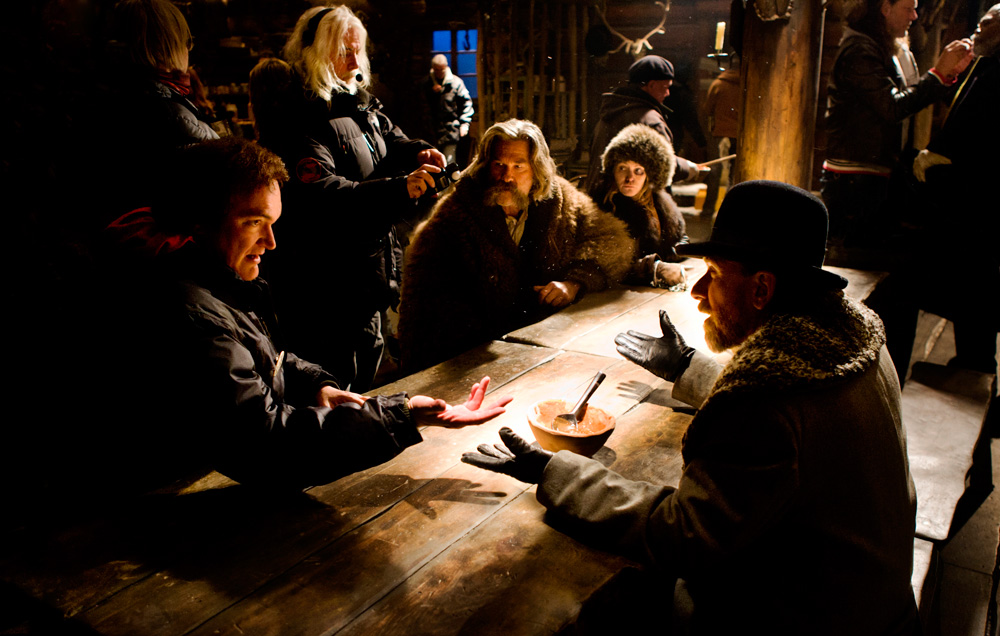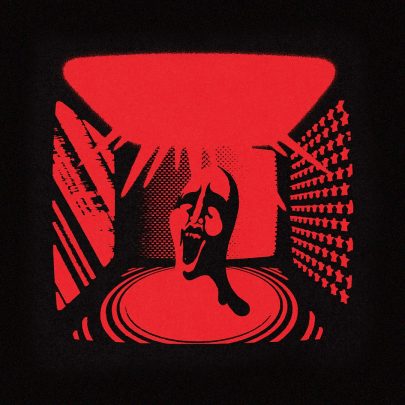Jan 22, 2016 Film & TV
Quentin Tarantino wraps his arms around a too-big cushion and cuddles on to the hotel couch with a view of clouds hanging heavy over Herne Bay behind him. The biggest deal director to consider even coming to New Zealand in – oh, I don’t know – forever is welcoming the relentless stream of press with a wide grin and bubbly enthusiasm to talk about his 8th film, The Hateful Eight.
The Western-slash-mystery is set during a blizzard a few years after the US Civil War. It’s verbose. Grandiose. Drenched in malice and bloody violence. Populated by magnificent actors playing Tarantino’s signature scoundrels.
The biggest cheers during the special premiere screening at Event Newmarket on Wednesday night were reserved for New Zealander Zoë Bell, commanding a stagecoach through the snow in her bubbly turn as Six Horse Judy. Frances Morton stepped aboard The Hateful Eight publicity stagecoach and talked to the superstar director about working with Bell, his favourite screenwriter (besides himself) and his unlikely pick for a favourite film of 2016 (hint: Anne Hathaway).
Is The Hateful Eight intended to be a political allegory about America or is that something that has been placed on it?
It hasn’t been placed on it. I think it absolutely is but it didn’t really start out that way. I think it grew out of the characters and grew out of the situation, and also to some degree or another it grew out of the zeitgeist. I remember when I was writing the piece when we were in the stagecoach and Mannix [Walton Goggins] and Warren [Samuel L. Jackson] have their political discussion. When I finished it I was like, ‘Oh wow, that was really political. That could almost be MSNBC having an argument with Fox News.’ That actually played into my theory that Westerns, probably more than any other sub-genres really reflect the decades in which they were made.

When you’re writing, which comes first – character or scenario?
I’ve yet to do a movie that was solely a character study. Like Taxi Driver with Travis Bickle. I have a scenario in mind but then it’s all about investing in the characters. When I get to the midway point of the story then the characters take it and they write out the scenario from that point on. I might help them out a little but for the most part it’s up to them.
Could you call The Hateful Eight a movie version of the basement scene in Inglorious Basterds?
Uh-huh. Yeah. I looked at it a little like a Western Reservoir Dogs when I started. But at the same time when I wrote the basement scene in Inglorious Basterds I thought, ‘Oh wow. This is like a 25-minute version of Reservoir Dogs but with Nazis’.
If you had to direct a script by someone else, who would it be?
Probably my favourite writer right now is Aaron Sorkin but it don’t think I’d be the person to direct one of his works.
Why not?
I guess because I wouldn’t want to give myself over to his work. However, there is a script – I’m not going to do it – that I always really liked a lot by David Webb Peoples, who wrote the Unforgiven and Blade Runner. He wrote a movie version of Sgt Rock that I always thought was really terrific. I don’t think I’m ever going to end up doing it but I really did like that script and it’s one of the few times I’ve considered doing another script.

When you have someone like the great Ennio Morricone doing your music, how much collaboration goes on?
It was interesting because he wrote the music not based on the movie but based on the script. I translated the script into Italian. He had a theme in his mind when he read the script. He described it to me as this driving theme that’s moving forward. It suggests the stage coach moving through the tundra but also there is the suggestion of the violence that will follow in there. First he was only going to do that theme and that was going to be it but then he got really inspired and he started writing more. He knew he wasn’t going to have time to spot the movie so he wrote these big pieces that he had in mind from the script then he wrote me other little pieces that he thought I could use. Something more sentimental. Something suspenseful. Then he gave it to me to put it in how he saw fit. But I actually thought it was a part of a master plan on his part because he knows that’s how I’ve always done it before and I’m more comfortable doing it that way.
Official Trailer: The Hateful Eight.
Why do you make Zoë Bell explicitly a New Zealander in your films?
Partly because she’s so charming as a New Zealander. She could bite down her accent. She has the capability. But frankly a lot of these New Zealand actors and Australian actors lose a lot of their charm. They lose a lot of the music in their voices when they have to do these American accents. Some of these poor actors haven’t talked in their own voice for 10 years. Sometimes it doesn’t really even make sense. They could have absolutely used their own accents. Zoë has such an effervescence with her New Zealand why would you not use it? Same thing with Tim Roth. Tim Roth has an American accent in Reservoir Dogs but every other time I’ve used him he’s always been British.
What would be your least favourite way to die? Eaten by rats would be right up there but I don’t know if I’m in much danger of that.
Portraying death – violent death – on screen in one of your fortes. What would be your least favourite way to die?
I guess burning alive. Eaten by rats would be right up there but I don’t know if I’m in much danger of that.
Being locked in a box, would be pretty horrible.
You’ve experienced that a couple of times in filmmaking.
So many people really have an affection for Michael Madsen’s character in that movie [Kill Bill Vo 2.] when he’s actually buried our hero alive. The worst thing he could possibly do.
It pops up in your episode of CSI too. Why did you do CSI?
I was a big fan of the show. And I really liked that character that William Peterson played, Grissom. I think he was the best detective on TV since Columbo. I really liked the idea of throwing my hat in that ring.
Would you do something like that again?
Not necessarily. I could do television like a mini-series or long form thing that I would write. But not go and do someone else’s show. I’ve done it three times. I’ve directed an episode of ER. I’ve directed an episode of CSI and I acted in a couple of episodes of Alias. I did all of them because I was a big fan of the show. However, the weird by-product of it is after I got through doing the show, I never watched it again. I don’t why. I guess I’ve invested in it so much I shut it off. If I like a show now I just want to keep liking it.
You recently did a roundtable for The Hollywood Reporter alongside other celebrated filmmakers [Tom Hooper, Alejandra G. Inarritu, Ridley Scott, Danny Boyle and David O. Russell, what’s it going to take to get a woman around that table consistently?
It does seem to be to some degree there’s a boom or bust aspect when it comes to Hollywood when it comes to female directors. There becomes an era when there’s a lot working then that settles down and there’s a dry period – but frankly – maybe I’m just talking shit because the thing is there are female directors. Maybe they’re not being the ones that are being asked to be on the Hollywood Reporter roundtable. One of my favourite movies this last year was Nancy Meyers’ The Intern. They’re not considering that for the Oscars even though I think Robert De Niro gave one of the best performances this year in that movie. I thought the script was actually one of her best. Right up there with It’s Complicated. They’re not asking her to be part of the discussion.
Your name is turning up on snubbed lists for this year’s Oscars, for being overlooked in the best director and best picture categories. Who are you gunning for to take home best picture?
I’m gunning for my three [best cinematography, best original score, best actress in a supporting role].
What about for the biggies – best picture and best director?
What I’m rooting for is Dr George Miller [Mad Max: Fury Road].
What’s the most important quality for being a successful director?
Being able to talk to actors goes without saying, even though there’s a whole lot of directors who don’t do that. I would think one of the giant prerequisites is you know what you want. There’s a vision and you’re decisive. Being decisive is very important. It doesn’t have to be the right answer – just an answer. From everything I hear directors tend to be a crazy indecisive lot.





